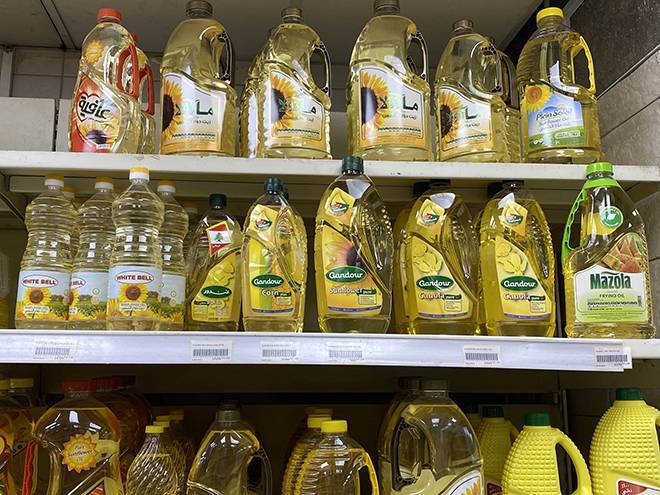
Subsidized cooking oil has become highly sought-after as Lebanon slides further into economic collapse. (Credit: Anne-Marie El-Hage/OLJ)
BEIRUT — A volunteer handing out food in Tripoli was killed and two others injured on Tuesday as scuffles stemming from food insecurity become a common sight across Lebanon, with the latest brawl breaking out Wednesday at a supermarket in Kesrouan.
Tuesday’s lethal incident occurred after armed clashes broke out in the Khanak area of Tripoli during the distribution of food packages, escalating into an exchange of gunfire.
Chadi Nachabe, a member of Tripoli’s city council, said that a local resident known as Sheik Soltan had received some 500 food aid packages from a donor in Australia to be distributed equitably among residents.
“The sheik had set up a distribution center and handed out coupons, with each person with a coupon receiving one package,” Nachabe told L’Orient Today.
With distribution underway, a group of four men attempted to grab more than one package, which led to a fight breaking out.
“These men are known as troublemakers, and one of them had a gun,” Nachabe said, adding that he fired his weapon and hit two others, including one of his associates.
The man killed was 23-year-old Karim Mehyedin, who had volunteered to help with the distribution, according to Nachabe and a source from the Internal Security Forces.
A video circulating on social media showed throngs of people looting the center as chaos ensued.
Police arrested the alleged shooter, identified as Abdel-Aziz Hassanen, along with his associates, the ISF source told L’Orient Today.
The incident fell on the first day of Ramadan, the Muslim holy month of fasting. This year’s observance occurs against the backdrop of Lebanon’s worst economic crisis in decades, with food insecurity soaring as residents struggle to secure even the most basic necessities.
Thanks to rapid inflation in food prices and stagnant wages amid Lebanon’s currency collapse, the cost of a full month of iftar meals for a family of five is now two and a half times the minimum wage of LL675,000, according to an analysis by the Lebanon Crisis Observatory, a research initiative of the American University of Beirut launched in 2020.
While the lira’s exchange rate has weakened to more than LL12,000 to the dollar, the state still subsidizes some 300 consumer products at a rate of LL3,900, with people swarming to buy items in short supply. Prices of many consumer goods such as diapers or cereals have nearly tripled during the crisis, which kicked off more than a year and a half ago.
Social media users have been sharing videos of supermarket brawls, with the latest fight taking place Wednesday in a Le Charcutier supermarket in Sarba, Keserwan.
“A Lebanese man started yelling that subsidized goods shouldn’t be sold to Syrians,” Riad Khairallah, the marketing director of the chain, told L’Orient Today.
“The man demanded that the supermarket limit the sale of subsidized items to Lebanese,” Khairallah said, which irked Syrian employees and residents who were present.
Lebanon’s central bank is currently draining its remaining foreign currency reserves, money ultimately belonging to Lebanese depositors, to maintain the subsidies on basic goods.
One of these goods is cooking oil, which was at the heart of Wednesday’s brawl.
“The two most in-demand items are oil and baby milk,” Khairallah said.
“It is impossible for supermarkets to dictate who can and cannot access these subsidized goods,” Khairallah said, adding that any such decision lies with the Economy Ministry.
In a letter to caretaker Finance Minister Ghazi Wazni on Wednesday, central bank Gov. Riad Salameh called on the government to quickly develop a plan for retargeting subsidies as the current policy is “no longer sustainable” and threatens the bank’s remaining dollar reserves.
Last week, Wazni announced that the government is looking into scaling back subsidies with the aim of slashing its annual bill from $6 billion to $3 billion.